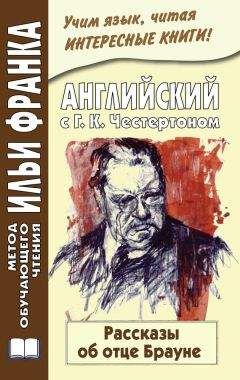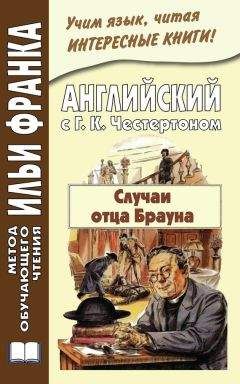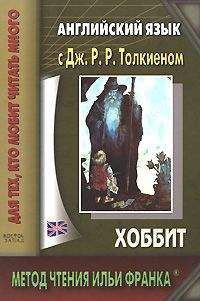“There is another picture, Flambeau,” said Brown in his more mystical undertone. “I can’t prove it; but I can do more – I can see it. There is a camp breaking up on the bare, torrid hills at morning, and Brazilian uniforms massed in blocks and columns to march. There is the red shirt and long black beard of Olivier, which blows as he stands, his broad-brimmed hat in his hand. He is saying farewell to the great enemy he is setting free – the simple, snow-headed English veteran, who thanks him in the name of his men. The English remnant stand behind at attention; beside them are stores and vehicles for the retreat. The drums roll; the Brazilians are moving; the English are still like statues. So they abide till the last hum and flash of the enemy have faded from the tropic horizon. Then they alter their postures all at once, like dead men coming to life; they turn their fifty faces upon the general – faces not to be forgotten.”
Flambeau gave a great jump (Фламбо подскочил). “Ah,” he cried, “you don’t mean (неужели вы хотите сказать) – ”
“Yes,” said Father Brown in a deep, moving voice (сказал отец Браун глубоким взволнованным голосом). “It was an English hand that put the rope round St. Clare’s neck (это была рука англичанина, которая накинула петлю на шею Сент-Клэра); I believe the hand that put the ring on his daughter’s finger (я полагаю, это та рука, которая надела кольцо на палец его дочери). They were English hands that dragged him up to the tree of shame (это были руки англичан, которые тащили его к дереву позора; to drag – тянуть, тащить; shame – стыд; позор; бесчестие); the hands of men that had adored him and followed him to victory (руки людей, которые почитали его и шли за ним к победе; to adore – обожать; поклоняться, почитать, преклоняться). And they were English souls (God pardon and endure us all!) who stared at him swinging in that foreign sun on the green gallows of palm (и это были англичане: «сердца англичан» (да простит и укрепит нас Господь!), которые смотрели, как генерал качался в лучах чужеземного солнца на зеленой пальме-виселице; soul – душа; сердце; to pardon – извинять, прощать; миловать; to endure – вынести, вытерпеть; выдержать; to swing – качать/ся/, раскачивать/ся/; gallows – виселица), and prayed in their hatred that he might drop off it into hell (и молились, полные ненависти, чтобы его душа попала в ад: «он провалился прямо в ад»; to drop – капать; бросать; сбрасывать; падать).”
Flambeau gave a great jump. “Ah,” he cried, “you don’t mean – ”
“Yes,” said Father Brown in a deep, moving voice. “It was an English hand that put the rope round St. Clare’s neck; I believe the hand that put the ring on his daughter’s finger. They were English hands that dragged him up to the tree of shame; the hands of men that had adored him and followed him to victory. And they were English souls (God pardon and endure us all!) who stared at him swinging in that foreign sun on the green gallows of palm, and prayed in their hatred that he might drop off it into hell.”
As the two topped the ridge there burst on them the strong scarlet light of a red-curtained English inn (когда они: «двое» достигли гребня холма, то увидели: «внезапно появился» сильный яркий свет из окон английской гостиницы с красными занавесками; to burst on – внезапно появиться; curtain – занавеска; inn – гостиница; постоялый двор). It stood sideways in the road, as if standing aside in the amplitude of hospitality (гостиница стояла рядом с дорогой и казалась очень гостеприимной; to stand; sideways – в сторону; сбоку, со стороны; amplitude – обширность; обилие, изобилие; hospitality – гостеприимство, хлебосольство). Its three doors stood open with invitation (три двери были радушно распахнуты: «три двери /гостиницы/ стояли открытыми с приглашением»); and even where they stood they could hear the hum and laughter of humanity happy for a night (и даже с того места, где они /отец Браун и Фламбо/ находились, они слышали говор и смех людей, которые были счастливы в такую ночь; humanity – человечество).
As the two topped the ridge there burst on them the strong scarlet light of a red-curtained English inn. It stood sideways in the road, as if standing aside in the amplitude of hospitality. Its three doors stood open with invitation; and even where they stood they could hear the hum and laughter of humanity happy for a night.
“I need not tell you more (нет необходимости говорить что-либо еще),” said Father Brown. “They tried him in the wilderness and destroyed him (они провели расследование/судили его в этом диком месте и убили его; to try – пытаться; проводить расследование; выяснять обстоятельства дела; wilderness – пустыня; дикая местность; to destroy – разрушать; уничтожать; лишать жизни, убивать); and then, for the honour of England and of his daughter, they took an oath to seal up for ever the story of the traitor’s purse and the assassin’s sword blade (а затем, ради славы Англии и /доброго имени/ его дочери они дали клятву вечно молчать о кошельке предателя и клинке шпаги убийцы; to take an oath – приносить присягу; traitor – изменник, предатель; purse – кошелек; деньги; богатство; assassin – убийца). Perhaps – Heaven help them – they tried to forget it (возможно – Небеса, помогите им! – они пытались забыть это; to forget – забывать). Let us try to forget it, anyhow; here is our inn (давайте и мы постараемся забыть; а вот и наша гостиница).”
“With all my heart (с большим удовольствием: «от всего сердца),” said Flambeau, and was just striding into the bright, noisy bar when he stepped back and almost fell on the road (сказал Фламбо и уже направился в ярко освещенный шумный бар, как вдруг оступился назад и чуть не упал на дорогу; to stride – шагать /большими шагами/; to step back – отступить назад).
“I need not tell you more,” said Father Brown. “They tried him in the wilderness and destroyed him; and then, for the honour of England and of his daughter, they took an oath to seal up for ever the story of the traitor’s purse and the assassin’s sword blade. Perhaps – Heaven help them – they tried to forget it. Let us try to forget it, anyhow; here is our inn.”
“With all my heart,” said Flambeau, and was just striding into the bright, noisy bar when he stepped back and almost fell on the road.
“Look there, in the devil’s name (посмотрите туда, что за черт)!” he cried, and pointed rigidly at the square wooden sign that overhung the road (закричал он, указывая /сурово/ на прямоугольную деревянную вывеску, которая висела над дорогой; square – квадратный; sign – знак; символ; вывеска). It showed dimly the crude shape of a sabre hilt and a shortened blade (не очень ясно было видно наспех нарисованную рукоятку шпаги и укороченный клинок; shape – форма; очертание; sabre – сабля, шашка; hilt – рукоятка, эфес /меча, кинжала/; shortened – укороченный; blade – лезвие, клинок;); and was inscribed in false archaic lettering, “The Sign of the Broken Sword (и псевдоархаичными буквами было начертано: «Сломанная шпага»; to inscribe – записывать; вырезать, начертать на дереве, камне /имя, надпись/; false – неверный; не настоящий, поддельный; lettering – надпись; буквенное обозначение).”
“Were you not prepared (вы /оказались/ не готовы к этому)?” asked Father Brown gently (спросил отец Браун мягко). “He is the god of this country (его боготворят в этой стране: «он божество в этой стране»); half the inns and parks and streets are named after him and his story (половина гостиниц, парков и улиц названа в честь генерала и его подвигов: «и преданий о нем»).”
“I thought we had done with the leper (я думал, мы покончили с этим прокаженным; leper – прокаженный),” cried Flambeau, and spat on the road (воскликнул Фламбо и сплюнул на дорогу; to spit).
“Look there, in the devil’s name!” he cried, and pointed rigidly at the square wooden sign that overhung the road. It showed dimly the crude shape of a sabre hilt and a shortened blade; and was inscribed in false archaic lettering, “The Sign of the Broken Sword.”
“Were you not prepared?” asked Father Brown gently. “He is the god of this country; half the inns and parks and streets are named after him and his story.”
“I thought we had done with the leper,” cried Flambeau, and spat on the road.
“You will never have done with him in England (в Англии с ним никогда не покончат),” said the priest, looking down (сказал священник, глядя на землю: «глядя вниз»), “while brass is strong and stone abides (до тех пор пока тверда бронза и не рассыпался камень; brass – латунь, желтая медь; мемориальная доска; to abide – вынести, пережить). His marble statues will erect the souls of proud, innocent boys for centuries (в течение столетий его мраморные статуи будут формировать души гордых наивных юношей; to erect – строить; сооружать; создавать, творить; century – столетие; век), his village tomb will smell of loyalty as of lilies (а его деревенская могила станет символом верности, как лилии; to smell – чувствовать запах; пахнуть; обонять; loyalty – верность, преданность). Millions who never knew him shall love him like a father (миллионы людей, никогда не знавших его, будут любить этого человека, как /родного/ отца) – this man whom the last few that knew him dealt with like dung (человека, с которым поступили как с преступником люди, которые знали его последними; to deal; dung – навоз; помет; удобрение). He shall be a saint; and the truth shall never be told of him, because I have made up my mind at last (его будут чтить как святого: «он будет святым», и правда о нем никогда не будет рассказана, потому я так решил наконец-то; to make one’s mind – решить, принять решение).
“You will never have done with him in England,” said the priest, looking down, “while brass is strong and stone abides. His marble statues will erect the souls of proud, innocent boys for centuries, his village tomb will smell of loyalty as of lilies. Millions who never knew him shall love him like a father – this man whom the last few that knew him dealt with like dung. He shall be a saint; and the truth shall never be told of him, because I have made up my mind at last.
There is so much good and evil in breaking secrets, that I put my conduct to a test (в разглашении тайн много и плохого и хорошего, правильность своего решения: «поведения» я проверю на опыте: «испытаю»; to break – ломать; вскрывать; нарушать; conduct – руководство, управление; поведение; test – проверка; испытание). All these newspapers will perish (все эти газеты исчезнут); the anti-Brazil boom is already over (антибразильская шумиха уже улеглась; boom – бум; активность; шумиха); Olivier is already honoured everywhere (Оливье повсюду чтут; to honour – почитать, уважать, чтить /кого-л., что-л./). But I told myself that if anywhere, by name, in metal or marble that will endure like the pyramids, Colonel Clancy, or Captain Keith, or President Olivier, or any innocent man was wrongly blamed (но я дал себе слово, если где-нибудь появится надпись, на металле или на мраморе, долговечном, как пирамиды, несправедливо обвиняющая /в смерти генерала/ полковника Кланси или капитана Кита или президента Оливье или другого невинного человека; to tell; to endure – вытерпеть; выдержать; длиться; продолжаться; innocent – невинный человек), then I would speak (тогда я заговорю). If it were only that St. Clare was wrongly praised, I would be silent (но если /все ограничится/ лишь незаслуженным восхвалением Сент-Клэра, я буду молчать; wrongly – незаслуженно). And I will (я так и сделаю).”




